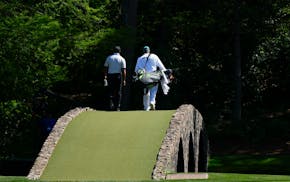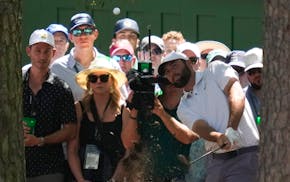Perhaps we should judge owners the same way we judge minor-league baseball players.
Owners, like 21-year-old rookies, stumble into the light unprepared for the speed, the scrutiny, the pressures of big-time sports. They hone their skills in relative anonymity and then one day they arrive in the big time and for perhaps the first time in their lives their flaws become more notable than their accomplishments.
In the year after Zygi Wilf bought the Vikings, he proved to be an awkward public speaker who looked amateurish in his firing of Mike Tice and his hiring of Brad Childress. He came across as the stereotypical new owner -- eager, emotional, ill at ease and desperate for validation.
Since then, though, Wilf has learned his craft and become an almost ideal owner, and tonight he will show off his newest prize when Brett Favre takes the field at the Metrodome.
Wilf rescued the Vikings from Red McCombs' cheapness, refurbishing Winter Park. He placed the organizational emphasis on winning with class, and, while no 53-man football roster is going to be without its problems, the Vikings have become a likeable team that last year went 10-6 and won the NFC North.
Most of all, though, Wilf has proved himself to be one of the most aggressive owners in the history of Twin Cities sports.
The trade for Jared Allen required high draft choices and lots of cash. Wilf ponied up. Even if Allen had failed, the move would have been impressive as a display of aggressiveness. As it is, Allen has become a dynamic and vital player at one of the most important positions in the NFL.
When the organization has recommended the signing of a player to a long-term contract, Wilf has ponied up, most recently signing cornerback Antoine Winfield.
This week, of course, Wilf proved willing to make the last move available to improve this year's squad -- signing quarterback Brett Favre to a two-year contract worth a potential $25 million.
It's a risk -- Favre is a soon-to-be 40-year-old quarterback coming off arm surgery who now says he has a torn rotator cuff. However this turns out, though, Wilf should be congratulated for possessing the competitiveness and business savvy to recognize the upside in signing Favre.
In the mid-'90s, the Twins recognized they were entering a rebuilding phase. They decided to stop spending money on free agents. In the short term, that approach made sense -- why spend $80 million to finish third when you could spend $30 million to finish fourth?
Over time, that approach proved penny-wise and pound-foolish.
The Twins saved lots of money during the late-'90s. They saved so much money they almost went out of business. They saved so much money that contraction became an attractive alternative to running a functional baseball franchise. They almost "saved" themselves into oblivion.
Even when franchises aren't particularly competitive on the field, they are in constant competition for fans' discretionary income. Giving fans reason to stop caring about your franchise is a bad business move, no matter how much cash you think you're saving for the moment.
Sports are not just about championships, otherwise we could have stopped paying attention after 1991. This is entertainment. Signing Favre guarantees the Vikings will be recognized not only as a franchise doing all it can to win a Super Bowl, but as the top sports entertainment attraction in the Upper Midwest.
Wilf has again proved himself an aggressive operator who understands the importance of being relevant and entertaining as well as competitive.
That will be true whether Favre retires again tomorrow, or hoists the Lombardi Trophy in a locker room full of purple.
Jim Souhan can be heard Sundays from 10 a.m.-noon on AM-1500 KSTP. jsouhan@startribune.com

Souhan: Why Tiger Woods should keep swinging
Souhan: Scheffler wins Masters again, shows what makes him special
Morikawa falters in final round at Masters

Keeping up with the Joneses who helped design Augusta National's classic back nine


